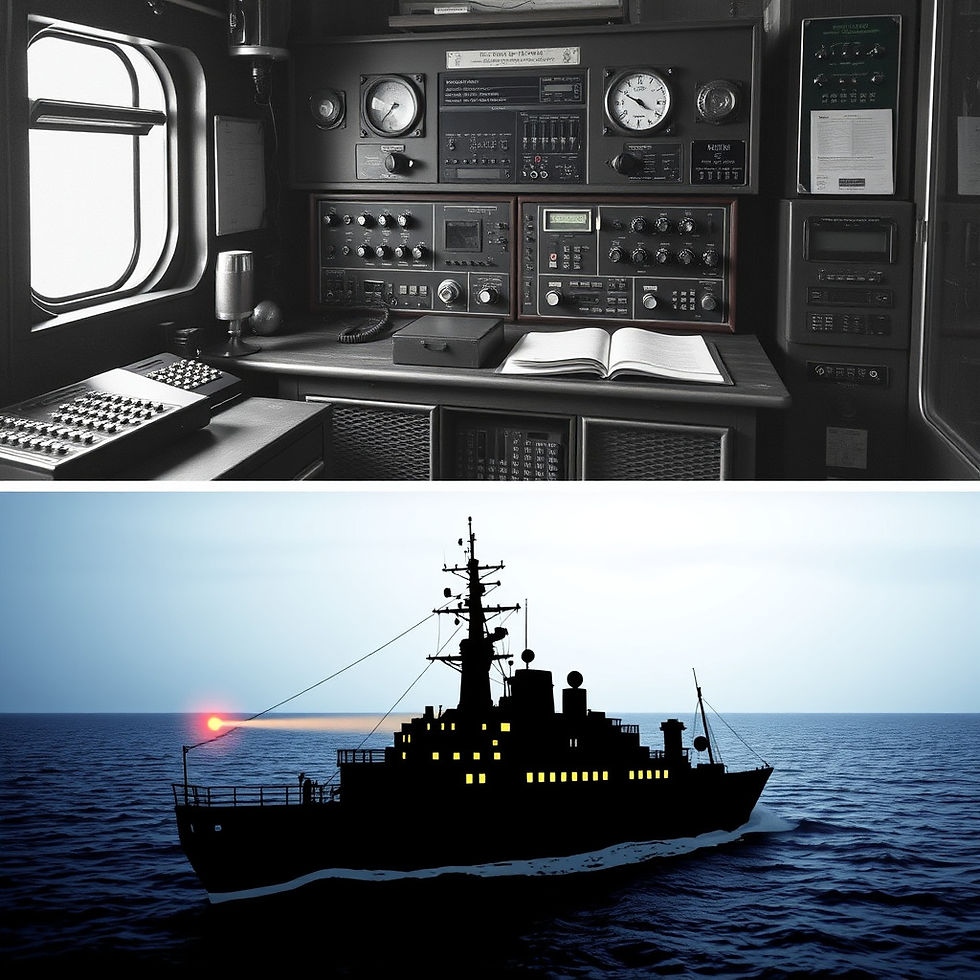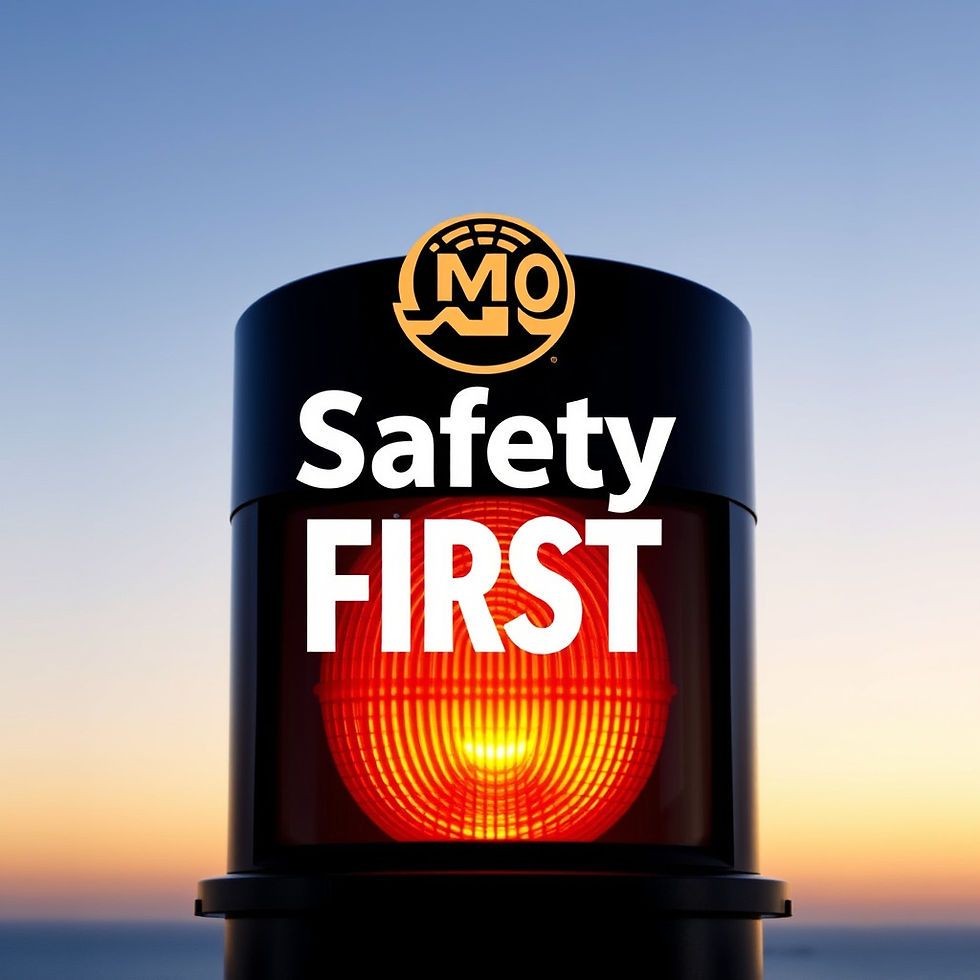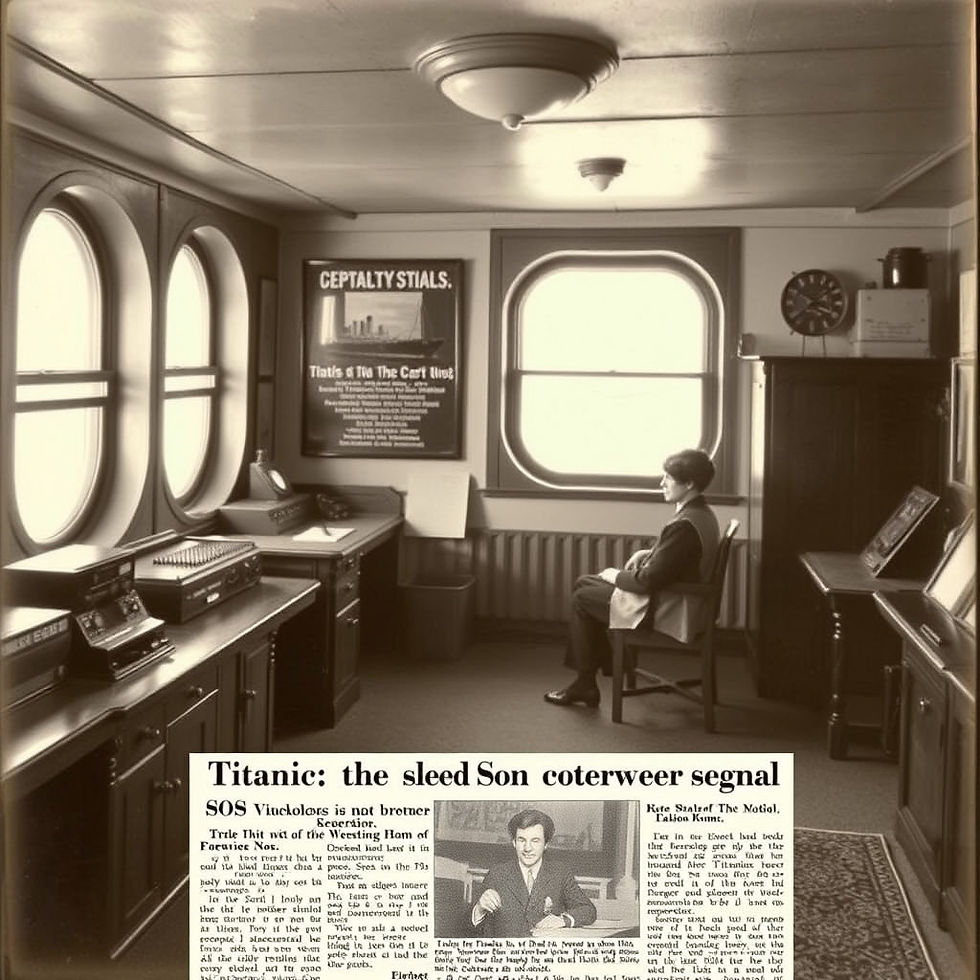Morse Code: The Unsung Hero of Maritime Communication – A Lifeline in the Age of Satellites
- kousik pattanayak

- Jun 10, 2025
- 6 min read
Updated: Aug 4, 2025

In the vast, unpredictable expanse of the ocean, where modern communication systems can mysteriously fail due to magnetic anomalies or complete blackout conditions, what happens then? When the sophisticated electronics go silent, there's an age-old method that consistently rises to the occasion: Morse code. This simple yet profound signaling method has, for centuries, served as a last-resort lifeline for ships, ensuring communication even in the direst of circumstances.
Today, we delve into the enduring relevance of this classic system. We will explore how Morse code works in maritime communication, its undeniable benefits, the crucial IMO regulations that mandate its use, its rich historical significance, and even how aspiring maritime students can learn it. Prepare to discover why dots and dashes remain indispensable for safety at sea.
What is Morse Code and How Does It Work?
At its core, Morse code is an ingenious system of communication that translates letters, numbers, and punctuation into sequences of short and long signals, universally known as dot-and-dash. Its genius lies in its adaptability across various transmission mediums:
Light signals: Ships can use powerful signal lamps (also known as Aldis lamps) to flash messages to nearby vessels or even aircraft, especially when silence is required or radio communication is compromised.
Sound signals: Using ship horns or whistles, mariners can transmit basic signals, particularly useful in fog or low visibility to warn other vessels.
Radio telegraphy: Historically, and still as a backup, Morse code is transmitted via shortwave transmissions, making it capable of reaching long distances without relying on complex digital infrastructure.
The key to its universal application in the maritime world is the International Code of Signals (INTERCO). This standardized system ensures that regardless of nationality or language, messages sent via Morse code are universally understood, preventing misinterpretation in critical situations.

Why is Morse Code So Essential in Maritime Communication?
Despite the leaps in satellite navigation and high-frequency radio, Morse code remains essential in maritime operations. Its continued relevance is due to several unique advantages:
Reliability in Extreme Conditions: Unlike digital systems, Morse code is astonishingly robust. It works even when electronic systems fail due to power outages, EMP (electromagnetic pulse) attacks, or severe weather disturbances.
Universal Understanding: Thanks to INTERCO, Morse code is standardized across all maritime nations. A distress call sent from a ship in the Atlantic will be understood by a rescue vessel in the Pacific, irrespective of language barriers.
Emergency Signaling: For critical Emergency Signaling, particularly distress calls like SOS (••• --- •••), Morse code is a globally recognized standard, ensuring that urgent pleas for help are received even when complex digital protocols fail.
Low-Tech Simplicity: It requires minimal equipment – often just a light source or a sound emitter – making it incredibly accessible and less prone to technical malfunctions than advanced systems.
Backup Communication: It acts as the ultimate backup communication method, a reliable fail-safe when modern systems are compromised, ensuring no vessel is ever truly cut off.
IMO Requirements for Morse Code Light Signals
The International Maritime Organization (IMO), the global standard-setting authority for the safety, security, and environmental performance of international shipping, formally mandates Morse code usage under the International Code of Signals (INTERCO). These regulations are in place to ensure maritime safety:
Ships must carry signal lamps capable of transmitting Morse code, ready for immediate use.
Distress signals, most notably SOS (••• --- •••), are universally recognized and must be transmitted via Morse code in emergencies.
Communication with nearby vessels and aircraft for navigational warnings, safety information, or general queries must follow standardized Morse code procedures.
Training for crew members in Morse code signaling is highly recommended, ensuring proficient operators are always onboard.
These stringent regulations underscore Morse code's enduring importance, ensuring that ships can communicate effectively in emergencies, even when modern technology falls short.

A Glimpse into History: Morse Code's Maritime Journey
Morse code, developed by Samuel Morse in the 1830s, quickly transcended land-based telegraphy to become a maritime communication standard by the late 19th century. Its journey is filled with pivotal moments:
Titanic Disaster (1912): This tragic event highlighted the critical role of Morse code. The ship sent distress signals using Morse code, leading to the rescue of hundreds of survivors by nearby vessels that received the urgent plea.
World War II: Morse code was used extensively for naval operations, enabling secure and reliable communication for tactical maneuvers and encrypted messaging across vast distances.
Cold War Era: It continued as a primary communication method, particularly for submarines and naval fleets, due to its robustness against jamming and its lower detectability compared to voice radio.
Even today, Morse code remains a powerful symbol of maritime resilience, a testament to human ingenuity, ensuring ships can communicate under almost any circumstances.

Preserving a Lifeline: How Can We Preserve Morse Code?
With the widespread adoption of digital communication, the traditional use of Morse code has declined, putting its proficiency at risk of becoming obsolete. However, preserving this reliable backup communication method is crucial for future maritime safety:
Maritime Training Programs: Ensuring that aspiring sailors learn Morse code as a fundamental part of their certification is paramount. This keeps the knowledge alive and ensures skilled operators are always available.
Integration with Modern Systems: While not a primary tool, integrating Morse code into modern communication protocols (e.g., as a fail-safe button) can remind users of its presence and utility.
Educational Initiatives: Encouraging students, not just maritime professionals, to learn Morse code through interactive courses, workshops, and clubs can foster a new generation of enthusiasts.
Simulation Drills: Regularly conducting emergency response exercises that specifically incorporate Morse code usage ensures that crew members maintain proficiency and know how to use it when needed most.
By actively maintaining Morse code proficiency, we ensure that ships always have a fallback, a silent, flickering language that transcends technology when all else fails.
Empowering the Next Generation: How Can Students Learn Morse Code?
For students interested in maritime communication or simply fascinated by this historic code, learning Morse code is more accessible than ever:
Online Courses: Platforms like Coursera, Udemy, and dedicated Morse code websites offer structured online courses that teach the code systematically.
Mobile Apps: Numerous mobile apps like "Morse Code Trainer," "Learn Morse Code," and "MorseMania" provide interactive lessons, practice exercises, and even games to make learning engaging.
Maritime Academies: Many Maritime Academies and nautical training institutions still include Morse code proficiency as a component of their curriculum, preparing students for real-world scenarios.
Practice with Flashlights: The most practical way to simulate real-world maritime signaling is to practice with flashlights, sending messages to a friend over a distance. This builds real-time transmission and reception skills.
Learning Morse code isn't just about delving into history; it's about ensuring safety and communication in critical situations, a skill that could one day save lives.

Conclusion: The Enduring Legacy of Dots and Dashes
Morse code, with its elegant simplicity, reliability, and universal recognition, remains a vital tool in maritime communication. In an era where technological dependency can lead to vulnerabilities, its role as a robust last-resort lifeline cannot be overstated. From the depths of ocean blackouts to moments of critical distress, dots and dashes have consistently provided a means for ships to connect.
By proactively preserving Morse code through education and training, we ensure that our vessels are always equipped with the means to communicate, no matter the circumstances. Its legacy is not just historical; it is a living testament to humanity's ability to innovate for survival, ensuring that in the vast, silent ocean, no ship is ever truly alone.
What are your thoughts on Morse code's role in modern maritime safety? Have you ever learned it? Share your insights in the comments below! If you found this informative, don't forget to share it with fellow maritime enthusiasts!



Comments